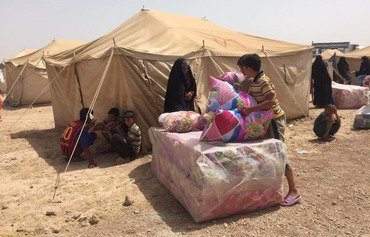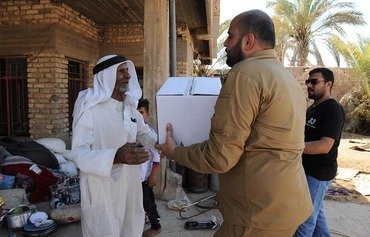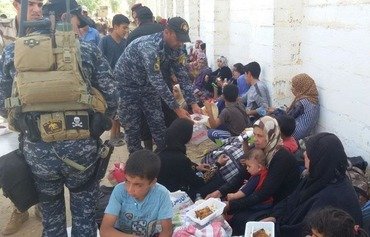Anbar's local government has launched a campaign to assist thousands of families who were displaced from Fallujah amid the battles to liberate the city from the "Islamic State of Iraq and the Levant" (ISIL), local officials said.
Before Iraqi forces moved in and reclaimed the city, Fallujah families were facing "disease, hunger and fear", displaced resident Raed Obaid, 53, told Mawtani.
"We went through dark days, with no medicines, food or safety," he recalled. "Terrorism was a cursed nightmare, but we have broken free from it."
"When my family and I reached the Ameriyat al-Fallujah camp I felt the taste of safety, which we had lost since ISIL overtook our city," he said.
Upon reaching the camp, Obaid said, he received urgent medical care as he was suffering from extreme exhaustion.
"First aid teams gave us immediate treatment and my health has started to improve now," he said. "We want to quickly return to our city to live without terrorism and fear."
Mobile medical teams deployed
The Anbar health department has set up a crisis team to oversee the health services being provided to displaced Fallujah residents, department head Dr. Shaker Ahmed al-Hajj told Mawtani.
"We have deployed medical teams and mobile health clinics in displacement camps in the areas of Fallujah, al-Khalediya and al-Habbaniya, and we are offering our service to the residents of these camps around the clock," he said.
"We offer treatment and immediate care to displaced residents and evacuate injured people and ones with medical emergencies to nearby hospitals."
The department has acted quickly to boost its services at displacement centres, he added, which include urgent vaccination campaigns for children and women and enhanced testing and medical consultation services.
Other programmes are being conducted in co-operation with supporting international organisations that include the provision of food and drinking water, cleaning services and pest control, al-Hajj said.
"Since the start of the Fallujah displacement crisis, we have been providing relief to displaced residents," Anbar migration department deputy director Majid Hamid told Mawtani.
The department has been delivering food and drinking water as well as household necessities such as bedding and furniture, he said.
Thousands in need of support
Around 13,184 families displaced from Fallujah have taken refuge in camps in Bazbiz, al-Habbaniyah, al-Khalediya and the Kilo-18 camp, Hamid said.
"These families have suffered from harsh humanitarian conditions during their displacement," he said. "We seek to alleviate their suffering, improve their conditions, and take care of them until they return to their original areas of residence."
The government has approved a proposal by Minister of Displacement and Migration Jassim Mohammed to once again "start giving all displaced Fallujah families ration card items", the ministry said in June 29th statement.
The Anbar provincial council "is co-ordinating with various government authorities and international humanitarian organisations to support relief operations for displaced Fallujah residents", said council member Yahya al-Mohammedi.
Around 80,000 people have been displaced from Fallujah and its surrounding areas, he told Mawtani, adding that regardless of what is being provided for them, these people remain in need of a redoubled relief effort.
Readying the city for returnees
The Ministry of Displacement and Migration "has promised us to equip al-Khalediya and al-Habbaniya camps with about 2,000 new tents soon", al-Mohammedi said.
The ministry also has promised to intensify humanitarian aid and health support "to match the scale of the crisis", he added.
"The people of Fallujah had spent more than two years suffering from ISIL's blockade, which denied them of all elements of life, and now that they have been saved, we must do everything possible to help them," he said.
The Fallujah administration must receive further help to reconstruct the city, mayor Issa Sayer al-Issawi told Mawtani.
"Rehabilitating public services and consolidating security in the city will speed up the population's return and end the displacement crisis, which puts a burden on both the displaced and the state," he said, urging the Iraqi government to expand the services provided to displaced Fallujah families .

![Two Iraqi ambulance workers assist a patient who was displaced from Fallujah. [Photo courtesy of the Anbar health department Facebook page]](/cnmi_di/images/2016/07/12/5825-Iraq-anbar-ambulance-600_384.jpg)






